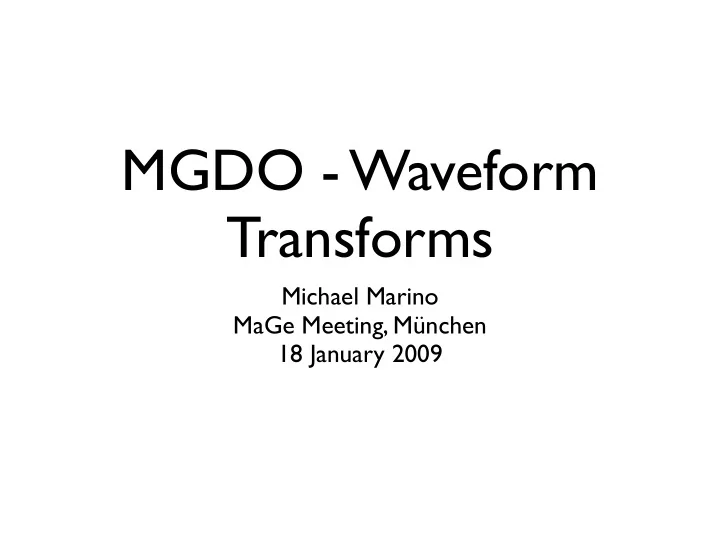

MGDO - Waveform Transforms Michael Marino MaGe Meeting, München 18 January 2009
Basics • Transforms: anything that does a calculation using a waveform (may or may not modify wf) • Design principal, same as OO: Do one thing, do it well. Transforms can be chained.
Basics • MGVWaveformTransformer: base class for time-domain transforms • MGVFreqDomainTransformer: base class for frequency-domain transforms (derives from above.) Automatically performs FFT on waveform.
Basics - For users • Every transform has the following function: • virtual void Transform(MGWaveform* input, MGWaveform* output); • FFT: virtual void TransformFT(MGWaveformFT* input, MGWaveformFT* output=NULL); // This performs the transformation on FT -ed wfs. Useful if you don’t want to use the automatic transformation performed by the base class. • NULL output means the function is performed “in-place” (input waveform is modified). This is ignored for pure calculation Transforms, i.e. those which
Basics - For coders • Functions to overload (base class handles calling the correct function at run-time). • virtual bool IsInPlace() = 0; // Overload this to tell base class if the transform does in-place transformations. • virtual void TransformInPlace(MGWaveform& /*input*/) {} // Overload this if transformation is in-place. • virtual void TransformOutOfPlace(const MGWaveform& /*intput*/, MGWaveform& /*output*/) {} // Overload this if transformation cannot be done in-place. • Also, base class requires a name passed into the constructor, i.e.: MGVWaveformTransformer( const std::string& aTransformationName )
Basics - For coders • FFT base class is similar: • virtual bool IsFTInPlace() = 0; // Overload this to tell base class if the transform does in-place transformations. • virtual void TransformFTInPlace(MGWaveformFT& /*input*/) {} // Overload this if transformation is in-place. • virtual void TransformFTOutOfPlace(const MGWaveformFT& /*intput*/, MGWaveform& /*output*/) {} // Overload this if transformation cannot be done in-place. • virtual void TransformFT(MGWaveformFT* input, MGWaveformFT* output=NULL); // This performs the transformation on FT -ed wfs. Useful if you don’t want to use the automatic transformation.
Utility Classes • MGWFMulti*Transformer • Allows chaining together of transforms • Call void AddWFTransformer(MGVWaveformTransformer*); then void Transform(MGWaveform* input, MGWaveform* output = NULL); • Especially good for FT waveforms, performs FFT only once.
Available Transforms
MGWFAddNoise • Adds noise to a waveform (primitive, soon to be updated to use FT of noise).
MGWFBandpassFilter • Applies a bandpass to a waveform.
MGWFBaselineRemover • Removes the baseline.
MGWFBaselineRemover • Removes the baseline.
MGWFDerivative, MGWFDerivativeFourthOrder • Takes the derivative
Live Demonstration
Available classes • MGWFDigitizer • Takes a "smooth" waveform with double precision and quantizes the amplitude. For PSA. • MGWFExtremumFinder • Find max or min of a waveform. • MGWFIntegral • Integrates class. • MGWFSmoother, MGWFSavitzkyGolaySmoother • Smoothing via S-G method. • MGWFMovingAverage • Performs moving average, smoothing
Available classes • MGWFMovingWindow • Performs moving average (e.g. used for trapezoidal filter) • MGWFPoleZeroCorrection • Corrects for pole-zero, assumes a baseline-removed waveform. • MGWFPulseFinder • Looks for a pulse that crosses a threshold (very simple threhold trigger). • MGWFRCDifferentiation, MGWFRCIntegration • Simple classes which mimic an RC preamp. • MGWFResampler • Transforms a waveform with one sampling frequency down to another with another frequency. • Can choose interpolation methods.
Available classes • MGWFRisetimeCalculation • Calculates rise-time of pulses • MGWFShiftSamples • Shifts samples left or right. • MGWFStaticWindow, MGWFStaticWindowCusp • Static window functions basically perform moving window average at one point in the waveform. • Used in energy calculation.
Recommend
More recommend